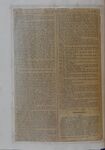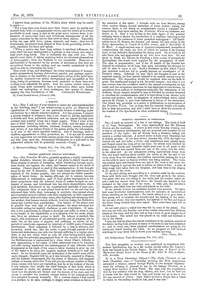HPB-SB-8-160: Difference between revisions
mNo edit summary |
mNo edit summary |
||
| Line 71: | Line 71: | ||
| item = 1 | | item = 1 | ||
| type = article | | type = article | ||
| status = | | status = proofread | ||
| continues = | | continues = | ||
| author = Massey, C.C. | | author = Massey, C.C. | ||
| Line 85: | Line 85: | ||
}} | }} | ||
... | {{Style S-Small capitals| Sir}},—May I ask any of your readers to assist my astrological studies in the following way? I am endeavouring to prove (or disprove) the signification of “houses” in one particular branch of astrology (solar revolutions) by a strictly inductive method. For this purpose, I require a greater number of instances than I can obtain by private application to friends and from published nativities, and an appeal through your columns may possibly bring me a larger supply. What I want is the time of birth within an hour; the place of birth; and the dates of any bereavement (including fathers, mothers, brothers, sisters, husbands, and wives) of any serious illness of the person giving the information, or of any of the above specified relatives. Also of marriage, birth of children, appointment to office, promotion, &c. I do not ask for names, as your paper does not circulate among people who are likely to practise any silly hoax upon me. Anonymous information on a post-card to the subscribed address will be gratefully received.—Yours, | ||
{{Style P-Signature in capitals| C.C. Massey.}} | |||
4, Harcourt-buildings, Temple, E.C., Feb. 17th, 1879. | |||
{{HPB-SB-footer-footnotes}} | {{HPB-SB-footer-footnotes}} | ||
{{HPB-SB-footer-sources}} | |||
<gallery widths=300px heights=300px> | |||
london_spiritualist_n.339_1879-02-21.pdf|page=13|London Spiritualist, No. 339, February 21, 1879, p. 95 | |||
</gallery> | |||
Latest revision as of 09:15, 11 July 2024
< Traces of Low in the Appearances of Spirits Embodied and Unembodied (continued from page 8-159) >
One point more, therefore.
5. This power is an attribute of what we call mediumship, and exists in the highest degree in those in whom psychic power is most developed.
We shall be prepared, by what we have now observed, to lay down one more law, or rather to note how the stirring of the inner nature under the influence of affection produces these phenomena. Love is the strongest motive power that spirit knows; and the cases are very numerous when it has caused an objective appearance. Such a case is recorded very circumstantially in Glimpses of the Supernatural by the Rev. F. G. Lee. It is too long for quotation, but the facts are these: A lady and her husband were returning from India in 1854, when she was taken dangerously ill in Egypt. She was aware of her danger, and had one desire only—to see her children who were in England. On the day of her death she fell into a deep sleep, from which she woke suddenly, saying that she had been and had seen her children. Shortly after she departed. At the time of her sleep it was ascertained that the children, then at Torquay with a friend, were playing in the house during a thunderstorm. All were in one room, and each, together with a nursemaid, saw a lady in white come into the room, and slowly glide by and fade away. The three elder children recognised their mother. The date, September 10, 1854, and time were noted, and the two events above recorded were found to have taken place simultaneously.
I need not multiply instances. They are on the tongue of every one who has paid attention to these subjects. Referring in passing to one of the most remarkable cases of the kind, which I recorded on the authority of Mr. Coleman, in Human Nature, July, 1877, p. 295, I pass on to note.
6. The most active cause of such appearances is the Law of Love.
We have seen that the spirit wanders readily while the body is asleep. There is another state, akin to sleep, in which it also finds it easy to manifest at a distance from the body. Before and at the time of death, as well as for a variable period after death, the spirit frequently leaves the body and follows its impulses of anxiety or affection. It seems as though it were hovering between this world and the next, not yet free, yet not so closely prisoned as before. Numberless cases of death warnings, death compacts, and of apparitions at the time of death are recorded, and that on testimony the most authentic. In many such cases the wandering spirit is moved by care. Worldly affairs need settling; an injustice has been done, and must be remedied; sometimes even the most trivial business will, being “on the mind,” suffice to send the spirit wandering. Or, again, affection is at work, and drives the spirit to visit those loved friends or relatives from whom it is to be shortly separated, or whom it has left behind. Many such apparitions occur at the time of death, or very shortly after, before the spirit takes its leave of the earth, and “goes to its own place.” This leads us to another law.
7. The time of death is one when the spirit is most free to wander, and most frequently manifests its presence at a distance from the body.
What has been said applies chiefly to cases where the apparition is that of a spirit still in the flesh. I believe the laws that govern the return of the departed are much the same, save that with them there is one more motive to be superadded, viz., guardianship over those committed to their care, and the fulfilment of the mission with which some of them have been entrusted. In some cases, too, it would seem that the spirit that manifests its presence in a manner which our superior wisdom would call objectless, is really occupied in a process of purification—is working out its salvation, and rising, through labour and suffering, to a state of greater progress.
Many cases of the return of departed spirits that have occurred in my own experience have been referable to the commands of a spirit higher than themselves, who directed I their action for a special and beneficial purpose.
Hauntings are referable, usually, if not always, to the action of earth-bound spirits. In some cases, “where the treasure is, there is the heart also;” in others, a crime has been wrought, and the spirit is linked with it till expiation has been made. In others, cupidity and avarice have survived, and hind the spirit to earth. The law’s are in all cases to be found in the affections, the desires, or the passions, or else in the effects of deeds done in the body. No doubt we may discover stories of apparitions for which no adequate motive can he discovered; but first of all we must be sure that, in such cases, the appearance was objective, not the fancy of an excited brain or the mere projection of thought acting on a sensitive, but a positive objective presentation. In such a case the reasons discoverable in almost all cases may well lead us to believe that there is a motive, only lying too deep for us to discover it at once; and that one or more of the motive-springs of spirit has been secretly touched.
The sum of what I have said may be stated thus:—
1. We have general indications of what we may expect in our search for law in the observable community of sensations, e.g., in twins, and between the mesmeriser and his subject.
2. So far as we can see, the power of action independent of the body is inherent in spirit; only some are more closely prisoned than others.
3. It apparently exists in the highest degree in those whom we call mediums.
4. In all cases it operates freely during bodily sleep, or when the body is in repose.
5. It acts more freely still in a medium who is in a state of entrancement.
6. It is especially active immediately before, at, or just after the time of death.
7. Very trivial causes—a mere desire to get something that is wished for—will suffice to liberate the spirit and allow it to appear apart from the body.
8. Any disturbing cause that stirs the depths of the spiritual or mental being, such as mental anxiety, acts more powerfully still.
9. But the most potent motive-spring of all is affection.
10. The return of the departed would seem to be affected by—
(a) Mental anxiety, e.g., about worldly business that has been left unsettled.
(b) Affection for those left behind.
(c) Guardianship.
(d) Distinct mission of mercy or instruction entrusted to “ministering spirits” by those higher than themselves.
Lastly. Haunting spirits are usually earth-bound, and even bound to certain localities with which their earthly life has been associated.
In some cases they would seem to exercise a certain monitory care over certain families, manifesting themselves only before death of certain members of them, or at epochs in the family history.
They are usually unhappy, and may frequently he released by the presence of a medium or by prayer.
I have, no doubt, omitted much; I have designedly confined myself to brief notices of what I have dwelt upon; and I do not presume to do more than suggest material for reflection.
A Request
Sir,—May I ask any of your readers to assist my astrological studies in the following way? I am endeavouring to prove (or disprove) the signification of “houses” in one particular branch of astrology (solar revolutions) by a strictly inductive method. For this purpose, I require a greater number of instances than I can obtain by private application to friends and from published nativities, and an appeal through your columns may possibly bring me a larger supply. What I want is the time of birth within an hour; the place of birth; and the dates of any bereavement (including fathers, mothers, brothers, sisters, husbands, and wives) of any serious illness of the person giving the information, or of any of the above specified relatives. Also of marriage, birth of children, appointment to office, promotion, &c. I do not ask for names, as your paper does not circulate among people who are likely to practise any silly hoax upon me. Anonymous information on a post-card to the subscribed address will be gratefully received.—Yours,
4, Harcourt-buildings, Temple, E.C., Feb. 17th, 1879.
Editor's notes
- ↑ A Request by Massey, C.C., London Spiritualist, No. 339, February 21, 1879, p. 95
Sources
-
London Spiritualist, No. 339, February 21, 1879, p. 95


